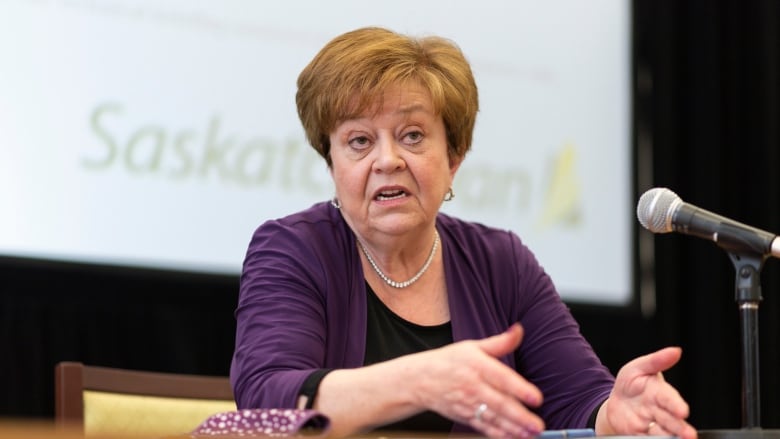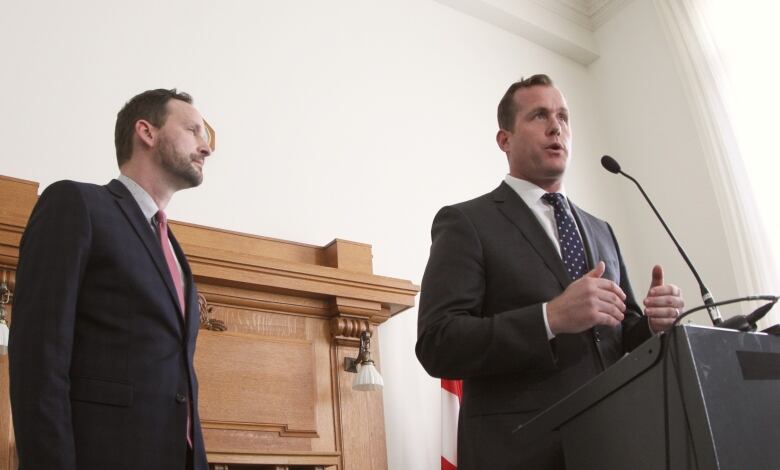Sask. government details more than $1B of COVID-19 spending in 2020-21 budget
Province expects to defer about $675M in taxes and fees due to pandemic

The government of Saskatchewan plans to spend about $1 billion on the COVID-19 pandemic over the course of the 2020-21 fiscal year.
The province released its full budget Monday afternoon, nearly three full months after it was originally expected.
Finance Minister Donna Harpauer said other ministries and agencies have repurposed $148 million for COVID-19 response since the pandemic was declared.
That's on top of what the government said is$900 million in new expenditurefor individuals, businesses and economy boosting initiatives.
Harpauer said the budget includes $502 million in spending announced since March 18 for pandemic-related support programs and economic stimulus.
The Saskatchewan government is forecasting the largest deficit in provincial history at $2.4 billion, whichHarpauer is calling a "pandemic deficit."
"The province's finances continue to be solid and our government will develop a plan to bring the balance back to budget over time," said Harpauer. "This will not be a one-year fix."
COVID-19 spending breakdown
Harpauer said the budget includes "record spending on health care" at $5.3 billion total for the sector, but a separatereport was released to detailCOVID-19-specific spending.
A $200-million Public Health and Safety Contingency is included in the budget. The government said thiswill "address difficulties in forecasting full year requirements for the pandemic."
A one time $50-million grant has been announced to help organizations that would normally benefit from gaming transfer revenue, but are missing out because casinos have had to close. Of that, $45 million will go to First Nation and Mtis organizations and $5 million will go to the Community Initiatives Fund.
The government will spend $4 million on enhanced court technology to facilitate fewer in-person appearances. The money will be spent on an online dispute resolution system for provincial offences and video conferencing equipment for RCMP, municipal policeand correctional facilities.
The province is also spending $3 million to bring in temporary structures for living spaces at correctional centres to allow for distancing and isolation during the pandemic.
The government has allowed businesses, taxpayers and ratepayers to temporarily defer payment of taxes and fees including PST, Crown utility bills, education property taxes and interest on student loans. That is estimated to total up to $675 million.
Harpauer said putting the budget together this year was very difficult because of the pandemic.
"The uncertainty in this budget, particularly on the revenue side, is larger than ever before," she said.
"We think that we have conservatism built in, we have a contingency built in so that we should be able to, at the very least, contain our expense side."
She said the numbersare also dependent on global economic recovery.
Spending already announced
The province filed some previously-announced funding underCOVID-19 spending.
This includes the $376 million committed to year one of its capital spending stimulus plan, along with$150 million provided for the clean-up of inactive oil and gas wells.
It also includes the province's Small Business Emergency Payment Program, which provided up to 15 per cent of monthly sales to a maximum of $5,000 in April. Thatcost $50 million.
The province is part of a cost-sharing agreement with the federal government, to the tune of $56 million. That money is being directed toward a temporary wage supplement program. An estimated 35,000 lower-income essential workers at senior-care, group homes, childcare facilities, and emergency and transition shelters became eligible for the $400-per month-supplement earlier in the spring.
Opposition criticizes spending, supports
Last Thursday, while unveiling the party platform ahead of this fall's election, the provincial Opposition Leader decried the province's spending around COVID-19 so far.
Ryan Meili said that prior to the COVID-19 pandemic,services were already spread too thin.
"Far too many people in Saskatchewan were already stretched and stressed, struggling to make ends meet," Meili said.
"This crisis has exposed and deepened those struggles and made action more urgent."

Meili also criticized the government's small business support program, saying it didn't provide the relief many local businesses needed to survive.
NDP finance critic Trent Wotherspoon also previously criticized the small business spending, saying entire businesses were shut out because they weren't forced to close by the health order.
A CBC News report from earlier this month indicated that some businesses already received up to $10,000 in aid, but they had to remain closed during the public health order.
But in a statement to CBC, the government's minister of trade and export defended the program and said it's the "best and most fiscally generous support program for small businesses in all of Canada."
After looking at the budget on Monday, Meilinoted that no details are present in the budget for spending after March 31, 2021. He said he is worried the government will use cuts to come back to balance.
He called the pandemic a "serious situation" and said now is the time for the province to be investing.
"They're trying to say that things don't really need to change between pre-COVID-19 and today and that's a completely inadequate response," said Meili.
With files from Adam Hunter, Creeden Martell and Kelly Provost












_(720p).jpg)


 OFFICIAL HD MUSIC VIDEO.jpg)
.jpg)



























































































